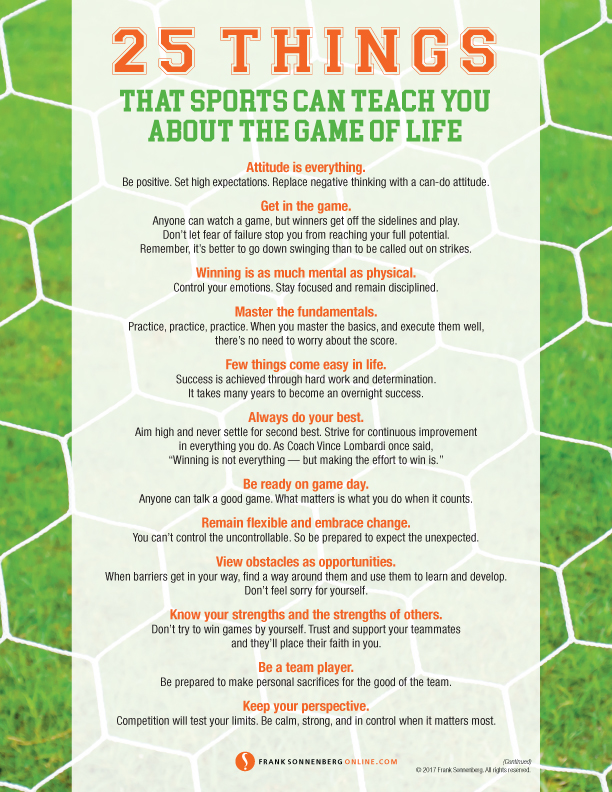
What Can Sports Teach You About the Game of Life?
Are you using every opportunity to prepare your children for the game of life? Take your cue from the great coaches in all sports and at all levels. They use sports to teach their players valuable lessons. Teach your child that success doesn’t come easily. Life is a continuing competition in which excellence wins. Therefore, it’s better to learn how to compete when the consequences are small. So if you aren’t using every opportunity to prepare your child for the game of life, your son or daughter is being cheated out of something very special.
Kids aren’t born with self-confidence or a positive attitude; kids don’t automatically know how to conquer fear, accept feedback, overcome obstacles, or snatch victory from the jaws of defeat; kids don’t always know what it’s like to come back after failure, to be a humble winner, or to show grace after a terrible loss. These skills are learned. So if you aren’t using every opportunity to prepare your child for the game of life, your son or daughter is being cheated out of something very special. Do your child a favor and teach him or her how to become a winner because even though it’s great to win a game, it’s even better to be a superstar in life.
25 Things That Sports Can Teach You About the Game of Life
- Attitude is everything. Be positive. Set high expectations. Replace negative thinking with a can-do attitude.
- Get in the game. Anyone can watch a game, but winners get off the sidelines and play. Don’t let fear of failure stop you from reaching your full potential. Remember, it’s better to go down swinging than to be called out on strikes.
- Winning is as much mental as physical. Control your emotions. Stay focused and remain disciplined.
- Master the fundamentals. Practice, practice, practice. When you master the basics, and execute them well, there’s no need to worry about the score.
- Few things come easy in life. Success is achieved through hard work and determination. It takes many years to become an overnight success.
- Always do your best. Aim high and never settle for second best. Strive for continuous improvement in everything you do. As Coach Vince Lombardi once said, “Winning is not everything — but making the effort to win is.”
- Be ready on game day. Anyone can talk a good game. What matters is what you do when it counts.
- Remain flexible and embrace change. You can’t control the uncontrollable. So be prepared to expect the unexpected.
- View obstacles as opportunities. When barriers get in your way, find a way around them and use them to learn and develop. Don’t feel sorry for yourself.
- Know your strengths and the strengths of others. Don’t try to win games by yourself. Trust and support your teammates and they’ll place their faith in you.
- Be a team player. Be prepared to make personal sacrifices for the good of the team.
- Keep your perspective. Competition will test your limits. Be calm, strong, and in control when it matters most.
- Be a leader. Set high standards of excellence for yourself and others. Make people feel special and help bring out the best in everyone.
- If you can’t play fair, don’t play. Integrity matters. Compete fairly and fully. When you resort to cheating, you’ve already lost.
- Quitting is not an option. There will be times when things get tough. Always keep hope alive and display confidence in the eye of defeat. As Morgan Freeman said, “The best way to guarantee a loss is to quit.”
- Accept responsibility for your actions. You’re in the driver’s seat. Only you can decide how hard you’re willing to work to achieve your goals. If you succeed, the rewards are yours. If you fail, there’s always another day.
- Learn to forgive. Forgive the mistakes of others. It may be your error that costs the team tomorrow.
- Support others in need. Real friends are available in good times and bad. So offer your teammates encouragement and support, especially when they have a bad day.
- Look to the future rather than the past. Don’t dwell on mistakes or past defeats. Learn from the experience and move on.
- Follow directions. Listen to your coach and respect the call of a referee, even if you disagree.
- Compete against yourself. Competing against others may be destructive if more effort is spent tearing others down than on improving your own game. When you compete against yourself, however, you both win.
- Raise your game. Find a good role model. Don’t be shy to ask for help. Be open to feedback and put it to good use.
- Say “no” to unhealthy behavior. Take care of your body. It’s the only one you’ve got.
- Know that losing doesn’t make you a failure. Be a good loser. Bounce back after a big loss.
- Be a good winner. Be a winner on and off the field. Be humble and quietly proud but never self-satisfied. And never let success go to your head.
 This post is adapted from BOOKSMART: Hundreds of real-world lessons for success and happiness, by Frank Sonnenberg.
This post is adapted from BOOKSMART: Hundreds of real-world lessons for success and happiness, by Frank Sonnenberg.
Do You Use Sports to Teach Your Kids About the Game of Life?
Please leave a comment and tell us what you think or share it with someone who can benefit from the information.
Additional Reading:
How to Be a Good Loser
Be Humble: Don’t Let Success Go to Your Head
Complacency: The Enemy of Success
25 of Life’s Most Powerful Lessons
If you like this article, subscribe to our blog so that you don’t miss a single post. Get future posts by RSS feed, email or Facebook. It’s FREE.



Frank,
Great post! No Coach Pond references?? He always put the game behind him after it was over and went forward regardless of outcome.
You’re right, Al. That’s an important life lesson. Don’t dwell on mistakes or past defeats. Learn from the experience and move on.
Thanks for taking the time to write 🙂
Best,
Frank
Very true facts of game life from sports lessons which could be turned into principles of game of life.
They sound stronger than teachings.
Thank you
Ernest
Sounds good to me 🙂
Best,
Frank